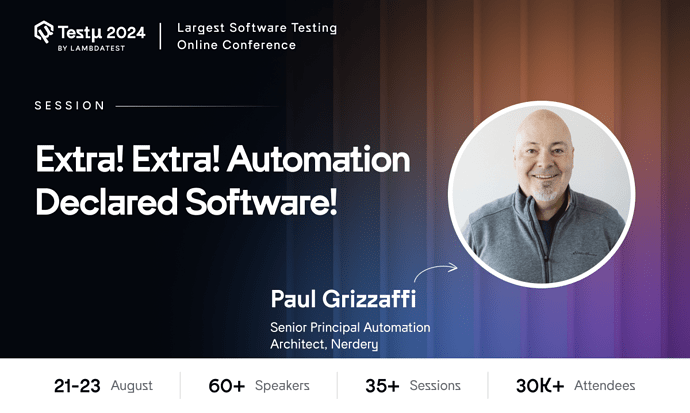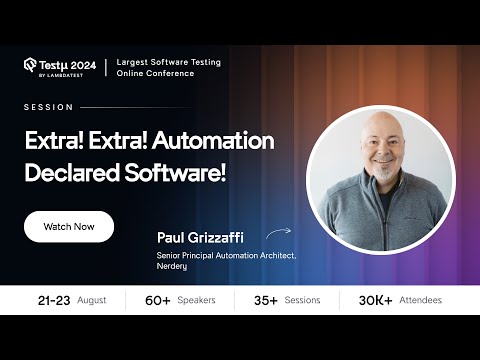 Rethink your approach to automation! In this groundbreaking session, Paul Grizzaffi unveils the truth that automation is not just a simple task—it’s software development in disguise.
Rethink your approach to automation! In this groundbreaking session, Paul Grizzaffi unveils the truth that automation is not just a simple task—it’s software development in disguise.
Whether you’re using AI, drag-and-drop tools, or record-and-playback interfaces, there’s always code behind the scenes. Ignoring this can lead to costly delays and unsustainable projects.
Still not registered? Hurry up and grab your free tickets: Register Now!
Already registered? Get ready to dive into the essential practices of treating automation like software development. Feel free to post your questions in the thread below 
Hi there,
If you couldn’t catch the session live, don’t worry! You can watch the recording here:
Additionally, we’ve got you covered with a detailed session blog:
Here are some of the Q&As from this session:
How do we push automation to companies that see it as secondary that reflects on our work as well being support only?
Paul Grizzaffi: To advocate for automation in companies where it’s seen as secondary, emphasize the long-term cost savings, increased efficiency, and improved accuracy that automation brings. Provide data-driven examples of how automation has benefited other companies or projects, and demonstrate quick wins where automation has delivered immediate results. Engage in educational efforts to show how automation aligns with the company’s strategic goals and how it can enhance overall productivity and quality, making it a core component rather than a support function.
What AI platforms can be used to help developers with unit testing?
Paul Grizzaffi: AI platforms like Testim.io and Applitools use AI to improve unit testing by automatically generating tests and detecting visual regressions. Tools like Diffblue Cover use AI to generate unit tests for Java applications, helping to ensure code quality and coverage. DeepCode offers AI-powered code review and static analysis to identify potential issues before they become bugs.
What are the benefits of using Nerdery over open-source automation tools?
Paul Grizzaffi: Nerdery offers benefits such as professional support, customization, and integration services that might not be available with open-source tools. With Nerdery, you gain access to expertise and consultation services, which can help in tailoring automation solutions to specific needs. Additionally, Nerdery provides dedicated support and potentially faster troubleshooting, which can be valuable for complex or enterprise-level projects.
How does automation development compare to traditional software development in terms of required skills and expertise?
Paul Grizzaffi: Automation development often requires a strong understanding of testing methodologies, scripting languages, and test frameworks. Skills in test design, data management, and tool integration are crucial. Compared to traditional software development, which focuses more on creating functional code and solving business problems, automation development emphasizes test strategy, test case design, and ensuring code reliability. While both fields require strong coding skills, automation development also demands a deep understanding of testing principles and continuous integration practices.
I have few cases where i can not run CI/CD pipelines du to harware limitation as my application need baremetal servers.
how to automate in these type of cases?
Paul Grizzaffi: In cases where CI/CD pipelines cannot be run due to hardware limitations, consider hybrid automation strategies. Use local automation scripts and manual testing where necessary, and integrate with a limited set of CI/CD processes that can run on your hardware. You can also explore cloud-based CI/CD services that support integration with on-premises environments or containerization techniques to simulate your bare-metal environment. Implementing test automation tools that can work in a restricted setup and ensuring synchronization between your local environment and any remote systems can help maintain automation effectiveness.
Here are some Unanswered Question that are asked in the session
How does automation integrate with continuous integration and continuous deployment (CI/CD) pipelines?
how did you manage to do all of these
What automation(s) would you suggest first if I’m an automated QA team of one? (I can only do so much as one single human being…)
If modern automation might be declared software, what might automation be or function like by, say, in 1-2 years?
How can we create Documentation with AI?
From my point of view
Automation integrates with CI/CD pipelines by:
-
Automated Testing: Tests are automatically executed at various stages of the pipeline, ensuring that code changes do not introduce new issues.
-
Feedback Loops: Automated test results are integrated into the CI/CD tools to provide immediate feedback to developers, facilitating quick fixes.
-
Deployment Triggers: Successful test passes can trigger deployments, streamlining the release process.
If you’re a one-person QA team, start with:
-
Test Automation Frameworks: Implement a framework like Selenium or Cypress for automated web testing.
-
API Testing Tools: Use tools like Postman or SoapUI for automating API tests.
-
Continuous Integration: Set up a CI tool (like Jenkins or GitHub Actions) to automate your test runs with each code change.
To create documentation using A you can follow these points:
-
Automated Content Generation: Use AI tools to generate draft documentation from code comments and design specifications.
-
Natural Language Processing (NLP): Implement NLP models to summarize key features and functionalities based on existing documentation.
-
Collaboration Tools: Utilize AI-driven documentation tools that allow real-time collaboration and version control, ensuring documentation is always up-to-date.
From my point of view, In the next 1-2 years, modern automation is likely to evolve significantly due to advancements in artificial intelligence (AI) and machine learning (ML). Here are a few potential trends and changes:
-
AI-Driven Automation: Automation will become more intelligent, with AI enabling systems to self-learn and adapt to new situations. This will reduce the need for manual intervention and make automation more flexible and predictive.
-
Hyperautomation: This refers to the combination of multiple automation technologies, including robotic process automation (RPA), AI, and machine learning, to automate complex processes end-to-end. It will allow businesses to automate virtually any repetitive task, even those that require some level of decision-making.
-
Autonomous Automation: With advances in autonomous systems, automation tools may become self-governing, capable of monitoring, adjusting, and optimizing their own processes without human input.
-
AI-Prompt Engineering: Automation might start functioning as prompt-based, where users provide high-level instructions (via natural language), and AI models generate, adapt, and execute the appropriate code for automation.
-
Increased Integration with IoT: Automation will become more integrated with the Internet of Things (IoT), allowing for seamless interactions between physical devices and software, making industries like manufacturing and logistics even more efficient.
-
Focus on Ethical Automation: As automation becomes more powerful, there will be growing emphasis on ensuring it is transparent, ethical, and doesn’t lead to job displacement without providing new opportunities for workforce reskilling.
These advancements are likely to make automation faster, more intuitive, and capable of handling increasingly complex tasks in the near future.
![]() Rethink your approach to automation! In this groundbreaking session, Paul Grizzaffi unveils the truth that automation is not just a simple task—it’s software development in disguise.
Rethink your approach to automation! In this groundbreaking session, Paul Grizzaffi unveils the truth that automation is not just a simple task—it’s software development in disguise.![]()

